Unit on Ableism - Campus Activism
Unit on Ableism - Campus Activism
Unit on Ableism - Campus Activism
- No tags were found...
You also want an ePaper? Increase the reach of your titles
YUMPU automatically turns print PDFs into web optimized ePapers that Google loves.
Have three students who have previously volunteered and been prepared for this roleplay taketheir places in fr<strong>on</strong>t of the class. Bring <strong>on</strong>e chair to the fr<strong>on</strong>t of the room. One student sits in thechair, while the others face her/him. All three are same-age students. The chair is a wheelchair;the pers<strong>on</strong> in the chair⎯the first patr<strong>on</strong>⎯is paraplegic, and the scene is in the first-floor lobby ofa movie theater. One of the other students plays a sec<strong>on</strong>d patr<strong>on</strong> who is not paraplegic; <strong>on</strong>e playsthe (student-age) assistant theater manager. (Remember that if real-life wheel-chaired studentsvolunteer to participate, they have the opti<strong>on</strong> of playing any of the three roles.)ScenarioIn the following scene, the sec<strong>on</strong>d patr<strong>on</strong> plays the part of some<strong>on</strong>e who wants to help, buther/his chief feeling about the chaired pers<strong>on</strong> is pity: “it’s so sad that you have this handicap.”The chaired patr<strong>on</strong> has bought a ticket to see a film <strong>on</strong> the sec<strong>on</strong>d floor, but the <strong>on</strong>ly access is bystairs (the elevator is broken, as it often is at this theater). This has happened before, and thistime she/he refuses to leave until something is d<strong>on</strong>e about the elevator. The manager plays anoverworked, embarrassed employee who is trying to talk the chaired pers<strong>on</strong> into leaving. She/hemight offer to have the chaired pers<strong>on</strong> taken out of her/his chair and carried up to the theater byother employees (the other patr<strong>on</strong> might offer to help do this); she/he might argue that it coststoo much to fix the elevator; or might end up angry at the chaired pers<strong>on</strong> for complaining toomuch, making things too inc<strong>on</strong>venient. The chaired pers<strong>on</strong> refuses to be lifted out of her/hischair, and holds to the principle that the theater is resp<strong>on</strong>sible for making movies “accessible” toevery<strong>on</strong>e.Invite students to play out the roleplay with the above directi<strong>on</strong>s for 2-3 minutes. Encourage thestudents enacting the sec<strong>on</strong>d patr<strong>on</strong> and the theater manager play their character parts fully,saying all the “wr<strong>on</strong>g” things.Freeze the roleplay. Have the actors take turns talking about how it felt to be in their roles,beginning with the chaired pers<strong>on</strong>. Then have other students report what they observed. Ask thefollowing, based <strong>on</strong> this roleplay:• How was the chaired pers<strong>on</strong> mistreated?• How did the chaired pers<strong>on</strong> resist mistreatment?• Does the pers<strong>on</strong> in the chair need assistance in this situati<strong>on</strong>?• What kinds of assistance were not helpful? Why?• What could a chaired pers<strong>on</strong> do to change this situati<strong>on</strong>? What could an ally do?Finish by having students applaud the actors.4. Access 25 minutesExplain that, like anti-sexism, anti-racism and anti-heterosexism movements, a powerfulresistance movement for disability rights, led by people with disabilities, has happened in thelast two-three decades in the <str<strong>on</strong>g>Unit</str<strong>on</strong>g>ed States. One of the most important things disability activistshave fought for is access, the right for people with disabilities to be enabled to participate in allareas of civic life that abled people do. Activists have c<strong>on</strong>tinually shown that “pity,” denial andminimizati<strong>on</strong> of the problem, or complaints that changes “cost too much,” are themselves part ofthe oppressi<strong>on</strong> of ableism.<str<strong>on</strong>g>Unit</str<strong>on</strong>g> <strong>on</strong> <strong>Ableism</strong>19



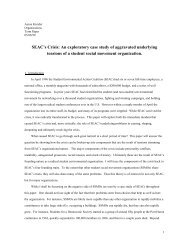

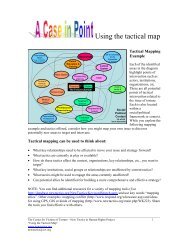
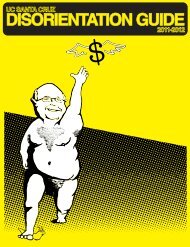

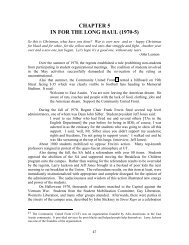
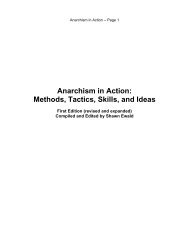

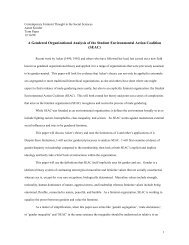

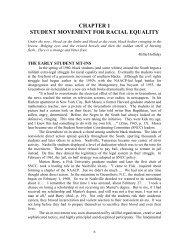
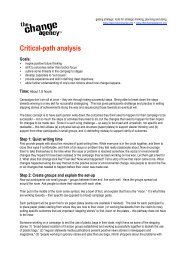
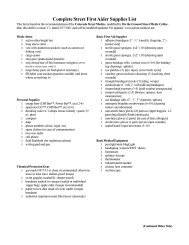
![Meaningful Student Involvement Research Guide [pdf] - SoundOut](https://img.yumpu.com/38822556/1/190x231/meaningful-student-involvement-research-guide-pdf-soundout.jpg?quality=85)